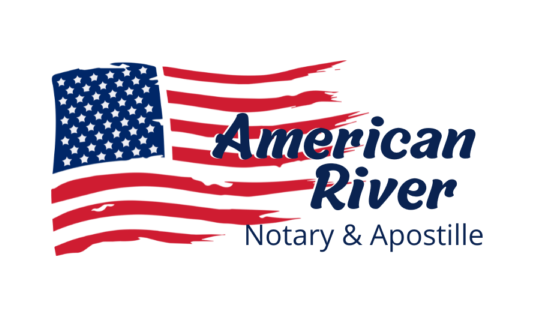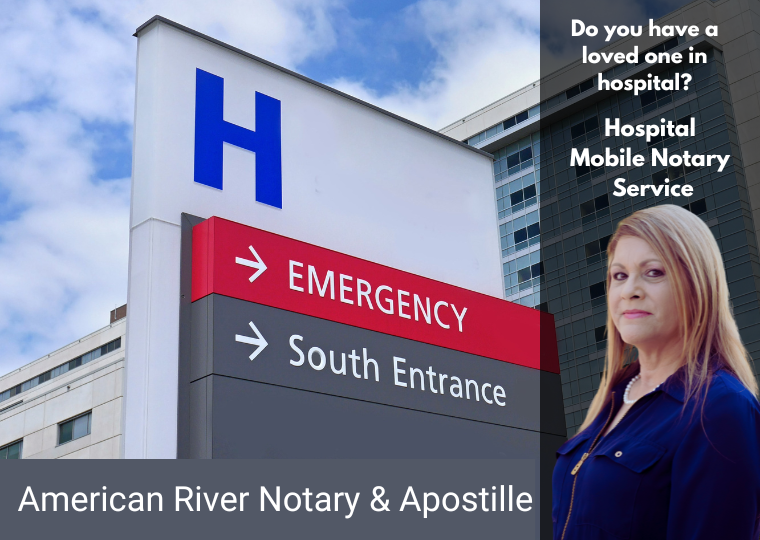Hospital notary services in Auburn, CA provide essential support to patients and their families during times of medical crisis. With the help of a professional mobile notary, you can have important legal documents notarized right at your hospital bedside, saving you time and stress during an already difficult time.
Auburn, CA What to do if you need a notary while in the hospital
The impossible happens – you or a loved one is hospitalized and unable to move about freely, but life continues, and the day-to-day bills still need to be paid; maybe the taxes need to be submitted, a home repair needs to be scheduled, or your child needs to be enrolled in an extracurricular activity. All of these activities continue and require your involvement and signature.
Let us help you focus on what matters most, your recovery and family. Have a professional mobile notary travel directly to your hospital bedside. American River Notary & Apostille is your local notary expert! Call (530) 354-2400 to discuss your unique notary needs or schedule online at americanrivernotary.com.
Notarization is a document-signing process that requires the presence of a state-certified Public Notary, a person who can legally certify the authenticity of the document signer’s signature[s].
BENEFITS:
- Local Pickup and Delivery in Auburn, CA; Roseville, CA; Sacramento, CA, and surrounding areas in Placer and Sacramento Counties
- Experienced in all facets of notary services and notary laws
- Online booking tool and live chat for questions
- Available evening and weekends
- Local to Colfax, Foresthill, Lincoln, Rocklin, Loomis, Newcastle, Sun City
- Local to Auburn Faith Hospital, Sutter Health Roseville, Kaiser Hospital Roseville
- Experienced with Estate Planning Documents, Power of Attorney, Wills, Trust Certification, Health Care Directives, Deeds, Tow Company Affidavit, Insurance Affidavit
- 11 years in business and operating since 2012 as a Mobile Notary Public
Notarization is a document-signing process that requires the presence of a state-certified Public Notary, a person who can legally certify the authenticity of the document signer’s signature[s].
Why you might need a hospital notary
Life happens, which sometimes means you’re unprepared for the legal documents required when your absence affects everyday life. For example, long-term recovery or terminal hospitalization might require urgent notarization to protect your final wishes and designate others to act on your behalf financially or medically if you cannot.
We understand that your unique circumstances might leave you feeling unsure of what to do next, but we can help with a prompt and friendly mobile notary expert right in the convenience of your hospital room.
We provide notary services at the following facilities:
- Auburn Oaks Care Center
- Siena Skilled Nursing
- Eskaton
- Solstice
- West View
- Rock Creek Care Center
- Kindred Transitional
- Sierra Ridge
- Oakwood
- Auburn Ravine Terrace
- Chateau
- Sr Care Villa Loomis
- Timberline
Note: A notary professional cannot provide legal services, draft documents, or give legal advice. It is best to seek a qualified attorney to answer legal questions before scheduling your notary appointment.
What you will need to notarize a document
To prepare for document notarization, there are a few important things that you need to have on hand. First, you need the document itself, as the notary needs to review and verify the notarial certificate before proceeding with the notarization process. Second, you need a government-issued photo ID so the notary can verify your identity, such as a valid driver’s license or passport.
On the day of your notary appointment, bring the document and your ID with you. First, the notary will review the document to ensure that the notarial certificate is complete and correct, then they will ask you to confirm that the contents are accurate. Afterward, the notary will ask you to sign the document before them, sign a notary journal and apply a thumbprint.
Basic notary requirements
A notary requires at least the following:
- The document you want to sign and have notarized
- A government-issued photo ID, such as a valid driver’s license or passport
- All witnesses present [as needed] with a government-issued photo ID present.
Special considerations for hospital notarizations
A Public Notary considers the following particular circumstances in their notarial process for hospitalized patients:
- Are they able to appear in person?
- Are they competent and willing to sign?
- Can they sign their name without assistance?
- Can the document be signed by X (Mark)?
- Are they under duress or pressure from another party to sign?
Completing the document notarization process
After the notary verifies all requirements, they will affix their official seal or stamp onto the document, including their signature, date, and other required information, such as the location and time.
Documents commonly notarized
The most commonly notarized documents for hospitalized patients might include but are not limited to:
- Affidavits: A sworn written statement made by a person voluntarily.
- Powers of Attorneys: Electing someone to act on an individual’s behalf financially or medically while alive.
- Contracts: A legally-binding agreement between two or more parties.
- Wills: An individual’s wishes on how they want their assets distributed and guardianship handled after death.
- Trusts: A fiduciary agreement where an appointed trustee holds on to designated assets for beneficiary distribution before or after the individual’s death.
- Living Wills and Healthcare Directives: An individual’s medical care wishes if they cannot make decisions for themselves.
- Guardianships or Conservatorships: One or more people appointed to make decisions on an individual’s behalf due to age or disability or for their dependents.
- Grant Deeds, Quitclaim Deeds, or a Transfer of Property Ownership: The transfer of property ownership from one person to another.
- Real Estate Closing Documents: The documents required for selling a property.
- Mortgage Documents: The terms and agreements for financing a property.
- Vehicle Titles and Registration: The transfer of a vehicle to another person or state-issued registration documents.
- Adoption Papers or Forms: New or existing adoption documents, such as a Certificate of Adoption.
- Personal Loan Agreements: A personal loan agreement between two parties.
- Prenuptial Agreements: The terms and agreements from both parties before getting married, which might include the division of assets in the event of divorce or death.
Schedule a notary appointment today!
While you are in the hospital, rely on American River Notary & Apostille to come to your bedside quickly and notarize all your essential legal documents. We make notary services easy from near or far! Appointment times are flexible and can be scheduled online or by phone! Call us at (530) 354- 2400 or schedule a Notary Appointment today.

